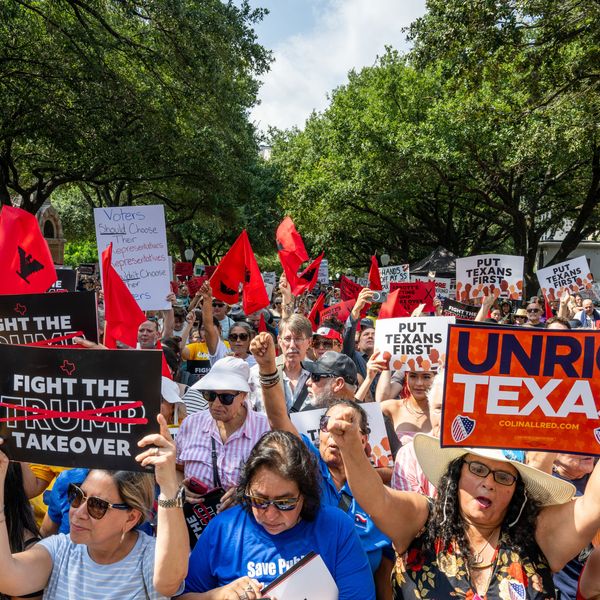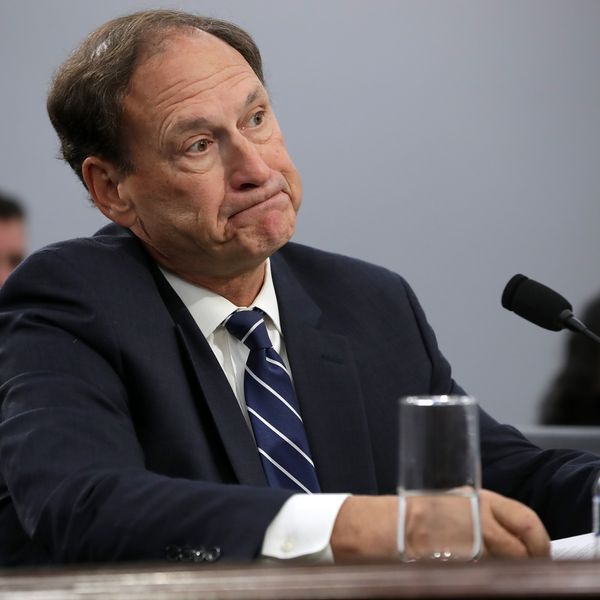A Texas-Sized Reminder of Why the Voting Rights Act Still Matters
Date on which a federal appeals court panel unanimously struck down Texas' photo ID requirement for voters, ruling that it has a "discriminatory effect" and thus violates the Voting Rights Act of 1965: 8/5/2015
Days before the 50th anniversary of President Lyndon B. Johnson's signing of the Voting Rights Act that the decision came in the Texas case, titled Veasey v. Abbott, which was brought by voters, civil rights groups and the U.S. Justice Department: 1
Number of federal courts that have now ruled against Texas' photo ID requirement, considered one of the nation's strictest: 3
Number of Texas voters who had to show a photo ID during the 2014 elections after the same federal appeals court allowed the law to take effect: 13.6 million
Estimated number of Texas voters who lack one of seven forms of approved ID: 600,000
Number of times more likely Hispanic and black registered voters, respectively, are than their white counterparts to lack the ID needed under the Texas law: 195, 305
Year in which Texas' Republican-controlled legislature passed the controversial photo ID law: 2011
Year in which a federal court blocked the law under Section 5 of the Voting Rights Act, which required Texas and other states with a history of voter discrimination to get federal preclearance for election law changes: 2012
Length of time that passed between when the U.S. Supreme Court in its June 2013 Shelby County v. Holder decision effectively struck down Section 5 and when Texas implemented its photo ID law: just hours
While the GOP majority in the Texas legislature claimed rampant voter fraud makes strict photo ID rules necessary, number of people who have actually been accused of such ballot fraud since 2004: 4
Section of the Voting Rights Act the Texas lawsuit was brought under, which prohibits practices that deny or abridge the right to vote: 2
Number of pages in the complicated ruling, which ordered the question of discriminatory intent and potential remedies back to the trial court for further review while rejecting the lower court's finding that that law represents an unconstitutional poll tax because of the cost of getting needed documents: 49
Percent odds observers give for Texas appealing the decision to the U.S. Supreme Court: almost 100
An Urgent Message From Our Co-Founder
Dear Common Dreams reader, The U.S. is on a fast track to authoritarianism like nothing I've ever seen. Meanwhile, corporate news outlets are utterly capitulating to Trump, twisting their coverage to avoid drawing his ire while lining up to stuff cash in his pockets. That's why I believe that Common Dreams is doing the best and most consequential reporting that we've ever done. Our small but mighty team is a progressive reporting powerhouse, covering the news every day that the corporate media never will. Our mission has always been simple: To inform. To inspire. And to ignite change for the common good. Now here's the key piece that I want all our readers to understand: None of this would be possible without your financial support. That's not just some fundraising cliche. It's the absolute and literal truth. We don't accept corporate advertising and never will. We don't have a paywall because we don't think people should be blocked from critical news based on their ability to pay. Everything we do is funded by the donations of readers like you. Will you donate now to help power the nonprofit, independent reporting of Common Dreams? Thank you for being a vital member of our community. Together, we can keep independent journalism alive when it’s needed most. - Craig Brown, Co-founder |
Date on which a federal appeals court panel unanimously struck down Texas' photo ID requirement for voters, ruling that it has a "discriminatory effect" and thus violates the Voting Rights Act of 1965: 8/5/2015
Days before the 50th anniversary of President Lyndon B. Johnson's signing of the Voting Rights Act that the decision came in the Texas case, titled Veasey v. Abbott, which was brought by voters, civil rights groups and the U.S. Justice Department: 1
Number of federal courts that have now ruled against Texas' photo ID requirement, considered one of the nation's strictest: 3
Number of Texas voters who had to show a photo ID during the 2014 elections after the same federal appeals court allowed the law to take effect: 13.6 million
Estimated number of Texas voters who lack one of seven forms of approved ID: 600,000
Number of times more likely Hispanic and black registered voters, respectively, are than their white counterparts to lack the ID needed under the Texas law: 195, 305
Year in which Texas' Republican-controlled legislature passed the controversial photo ID law: 2011
Year in which a federal court blocked the law under Section 5 of the Voting Rights Act, which required Texas and other states with a history of voter discrimination to get federal preclearance for election law changes: 2012
Length of time that passed between when the U.S. Supreme Court in its June 2013 Shelby County v. Holder decision effectively struck down Section 5 and when Texas implemented its photo ID law: just hours
While the GOP majority in the Texas legislature claimed rampant voter fraud makes strict photo ID rules necessary, number of people who have actually been accused of such ballot fraud since 2004: 4
Section of the Voting Rights Act the Texas lawsuit was brought under, which prohibits practices that deny or abridge the right to vote: 2
Number of pages in the complicated ruling, which ordered the question of discriminatory intent and potential remedies back to the trial court for further review while rejecting the lower court's finding that that law represents an unconstitutional poll tax because of the cost of getting needed documents: 49
Percent odds observers give for Texas appealing the decision to the U.S. Supreme Court: almost 100
Date on which a federal appeals court panel unanimously struck down Texas' photo ID requirement for voters, ruling that it has a "discriminatory effect" and thus violates the Voting Rights Act of 1965: 8/5/2015
Days before the 50th anniversary of President Lyndon B. Johnson's signing of the Voting Rights Act that the decision came in the Texas case, titled Veasey v. Abbott, which was brought by voters, civil rights groups and the U.S. Justice Department: 1
Number of federal courts that have now ruled against Texas' photo ID requirement, considered one of the nation's strictest: 3
Number of Texas voters who had to show a photo ID during the 2014 elections after the same federal appeals court allowed the law to take effect: 13.6 million
Estimated number of Texas voters who lack one of seven forms of approved ID: 600,000
Number of times more likely Hispanic and black registered voters, respectively, are than their white counterparts to lack the ID needed under the Texas law: 195, 305
Year in which Texas' Republican-controlled legislature passed the controversial photo ID law: 2011
Year in which a federal court blocked the law under Section 5 of the Voting Rights Act, which required Texas and other states with a history of voter discrimination to get federal preclearance for election law changes: 2012
Length of time that passed between when the U.S. Supreme Court in its June 2013 Shelby County v. Holder decision effectively struck down Section 5 and when Texas implemented its photo ID law: just hours
While the GOP majority in the Texas legislature claimed rampant voter fraud makes strict photo ID rules necessary, number of people who have actually been accused of such ballot fraud since 2004: 4
Section of the Voting Rights Act the Texas lawsuit was brought under, which prohibits practices that deny or abridge the right to vote: 2
Number of pages in the complicated ruling, which ordered the question of discriminatory intent and potential remedies back to the trial court for further review while rejecting the lower court's finding that that law represents an unconstitutional poll tax because of the cost of getting needed documents: 49
Percent odds observers give for Texas appealing the decision to the U.S. Supreme Court: almost 100

